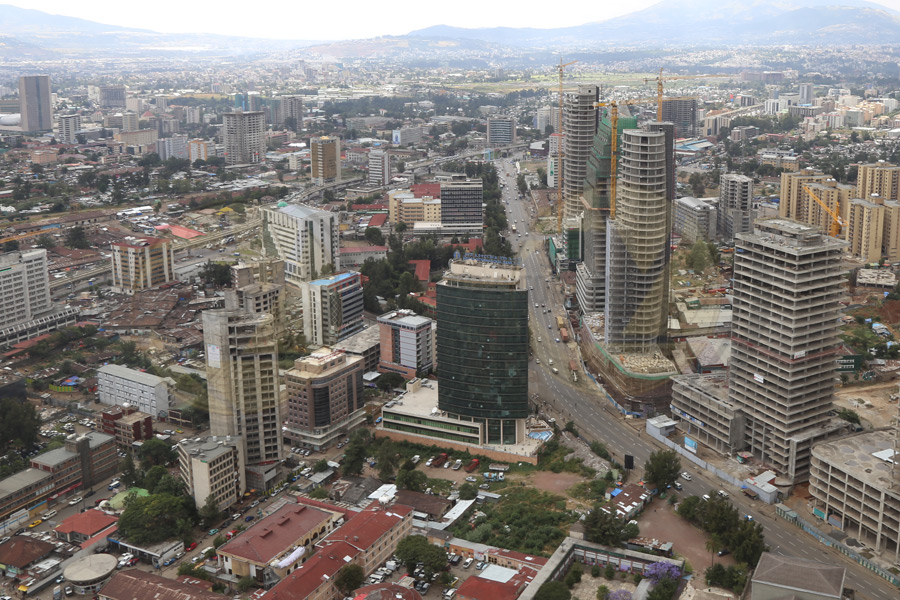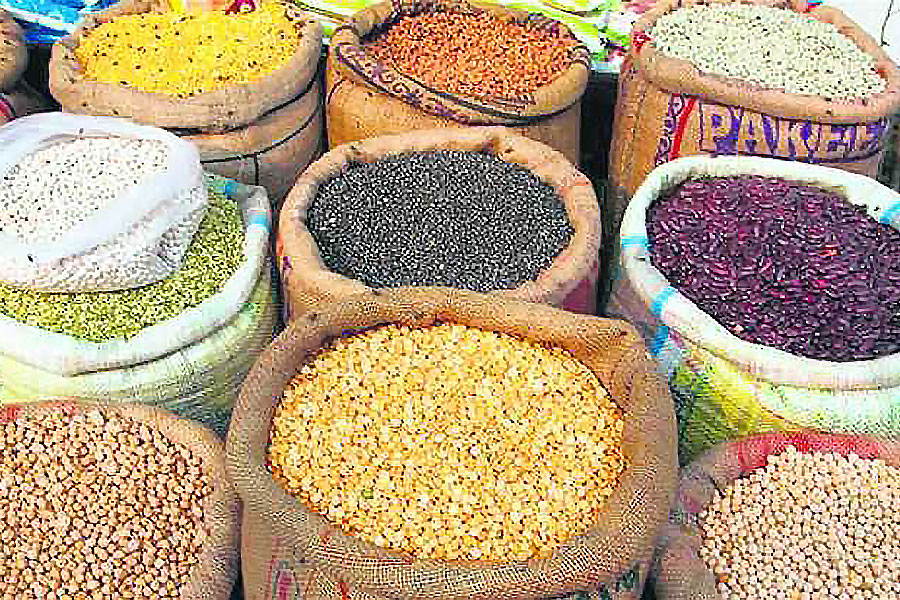
Commentaries | May 15,2021
May 14 , 2022.
Diana Yohannes is one of those actively engaging in social media platforms with her Twitter account @Shai-buna. She is enthusiastic about faith related subjects. But her recent tweet poked a pertinent question wondering how "people are making ends meet in Ethiopia." She challenged her followers to show actual numbers and not "shrugs-off". One respondent, @AdmasuRekik, would rather see the question directed to policymakers such as Eyob Tesfaye (PhD), state minister for Finance.
Eyob has been the public face of the "Home Grown Economic Reform Agenda." Once touted by multilateral financial institutions as a fitting replacement to the EPRDFites' demand-side economics, it is now nowhere mentioned. However, Ahmed Shedie, his boss at the Ministry, sits on the National Macroeconomic Council, which occasionally meets to chart out economic policy paths. So did the Council meeting last week zoomed on an issue Diana and her followers are curious about. Chaired by the Prime Minister, the Council concluded inflation has been the most challenging feature of the economy.
It would be rash to argue against such a relevant conclusion. In a negative macroeconomic environment where wages are stagnant and businesses are depressed, asking questions about how households survive runaway inflation is not limited to social media enthusiasts such as Diana. A combination of currency erosion and galloping inflation eat up household purchasing power, sending the poor to utter destitution and pushing the middle class down to the poverty line.
Indeed, how do people survive where high prices are driven by food inflation that reached 43pc in April?
It ought to be depressing to realise that there will possibly be no respite in the immediate from the scourage of inflation. More ominous should be the absence of insight and direction from policymakers whose statement shows glaring omissions of several macroeconomic factors affecting the wellbeing of millions. Severely constrained productivity and the army of the unemployed, whose numbers are in tens of millions, did not find the space it warranted in the statement issued by the Council late last week.
The economic trauma has been given little attention in an environment of toxic political culture. The current discourse parallels the 1970s in its intensity and bitterness. Nearly every issue remotely related to politics is thrashed out in the public squares such as social media and even modest get-togethers. Despite the acute sensitivity, even in the face of persistent and punishing food inflation, economic issues do not command analytic attention worthy of their weight.
There are few other explanations why the Macroeconomic Council would suppose that the past three quarters of the fiscal year were anything but positive. Concluding an assessment of the nine-month performance, it suggests that the economy is moving in the right direction, bar a few obstacles.
Yet, it could not overlook the challenges, though it dismissed them as not grave enough to thwart growth. It started with the civil war in November 2020, holding it responsible for wreaking havoc on trade, infrastructure, property and diplomatic relations with the West. It concedes a war fought thousands of kilometres from Ethiopia (in Ukraine) is also impacting the economy through the rise in international prices of commodities. Natural events have also contributed, such as the COVID-19 pandemic and the drought in southern and eastern parts of the country, which has led to displacements and increased food insecurity.
But for all of these, the Council determines that the Administration’s responses have thrown off the yoke of the burdens and delivered growth. "All is well," it seems to be saying. It finds proof of this from economic performances in the first two quarters of the year, which its Wisemen - and only a woman in their midst - say suggests an economic growth of around 6.6pc.
What is contributing to such growth?
The Council does not provide figures but insists that all the three main factors show positive results: productivity in wheat has increased; the service sector rebounded as COVID-19 ebbs; and investments in the industrial sector began to show promises once again.
The Council seems to have made a lot out of the 1.6 trillion Br aggregate deposit mobilised by the banking industry to signify economic sanguinity.
The omission of how this amount has been eroded due to inflation and exchange rate variation ought to be noted though. Nevermind that non-performing loans are alarmingly gone up, and at least three private banks are in serious trouble that could lead to failure if not addressed in time. Merchandise export receipts are lauded for reaching new highs, but it is not emphasised that this had little to do with any structural improvements but higher global prices for coffee beans that brought a record one billion dollars in 10 months.
The macroeconomic ailings the Council accorded prominence, inflation, is treated as a problem in and of itself. It should be viewed as a manifestation of a deeper macroeconomic ailment afflicting the broader economy. The Council has ignored - perhaps conveniently - the real source of inflationary pressure its members appear to be preoccupied with.
The exponential growth in money creation, the overall broad money supply reached 28pc of teh GDP, was overlooked. Governments often use it to finance growing budget deficits. Ethiopia's budget is projected to hit four percent of the GDP this year, the highest since 2006. Indeed, Ethiopia's budget history does not enjoy a budget surplus (except in 2003), but a deficit of this size is a feature of a war economy observed in the late 1980s (last years of the Derg) and 1990s (war with Eritrea). The public debt ratio to the GDP is climbing back to the 60pc four years ago when Prime Minister Abiy Ahmed (PhD) took office and pledged to bring it down.
Perhaps, the most glaring omission is the Birr’s ever depreciating value against a basket of major currencies, which is one of the biggest headaches to businesses and even state enterprises as capital expenditure planning has been made highly precarious. The painful forex crunch almost every business suffers from, and bankers are grumbling about is a reflection of deepening trade and current account deficits, at 3.4 billion and 1.6 billion dollars, respectively. These are a few occasions in over a decade where deficits grew so wide.
Policymakers' oversight to bring up critical macroeconomic challenges other than inflation is emblematic of a broader problem. The Administration is trying to sail an economic rainstorm without an overarching growth paradigm that guides its policymaking. There is no conviction or agenda that serves as a foundation for development. The alarming factor in the economic governance could be that there appears to be no comprehensive plan to respond to today's domestic and external pressures.
The Administration has no obvious path to increasing revenues or finding budgetary support because of political chaos that has hamstrung supply chains and diplomatic relationships with development partners. No direction is given on what is being done to support the Birr’s exchange value or how foreign currency reserves could be beefed up.
Prime Minister Abiy's Administration had a promising start with the Homegrown Economic Reform agenda to serve as a blueprint for economic policymaking. It was meant to guide the economy from decades of demand-driven developmentalism through heavy state involvement to private sector-led, supply side growth. Rarely is this reform agenda brought up in economic dialogues, briefings or policy discussions lately. There is not much to show for it on the ground as liberalisation and privatisation plans have stalled, with only the telecom sector as an outlier. Anticipated opening ups in the monetary policy front, easing controls on the capital account or exchange rates have gone nowhere.
Even if the homegrown reform agenda seems not disregarded entirely and idles somewhere at the back of the minds of policy wonks the Prime Minister gathered around, its relevance now should be questionable. For Ethiopia and the world, the past three years have seen the unravelling of an international order that had existed for three decades. The era of cheap money is over, great power competition is back, international supply chains are no longer dependable, and global capital movement is likely to be curtailed.
At the core of the policy paralysis is the absence of an economic growth model that could anchor policymaking. Developing such a model could be informed by the domestic realities of political turmoil, slow economic growth and heightened social incohesion. The pressure from external sources is compounded by negative macroeconomic factors such as inflation, rising energy costs, upward interest rates, expanding deficits and widely disrupted global supply chains.
The first step to addressing a problem is recognising it exists, not being in denial. The Macroeconomic Council needs to go back to the drawing board and outline its priorities as it responds to the day's unique challenges. No less important is that it settles on an overriding creed that could serve as a foundation for its economic governance and policymaking - both in sickness and health.
PUBLISHED ON
May 14,2022 [ VOL
23 , NO
1150]

Commentaries | May 15,2021

Fortune News | Sep 27,2025

Fortune News | Feb 02,2019

Radar | Nov 03,2024

Commentaries | Feb 16,2019

Editorial | Apr 08,2022

Radar | Oct 14,2023

Viewpoints | Apr 06,2019

Editorial | Feb 19,2022

Fortune News | Mar 19,2022

Photo Gallery | 180385 Views | May 06,2019

Photo Gallery | 170585 Views | Apr 26,2019

Photo Gallery | 161628 Views | Oct 06,2021

My Opinion | 137278 Views | Aug 14,2021

Dec 22 , 2024 . By TIZITA SHEWAFERAW
Charged with transforming colossal state-owned enterprises into modern and competitiv...

Aug 18 , 2024 . By AKSAH ITALO
Although predictable Yonas Zerihun's job in the ride-hailing service is not immune to...

Jul 28 , 2024 . By TIZITA SHEWAFERAW
Unhabitual, perhaps too many, Samuel Gebreyohannes, 38, used to occasionally enjoy a couple of beers at breakfast. However, he recently swit...

Jul 13 , 2024 . By AKSAH ITALO
Investors who rely on tractors, trucks, and field vehicles for commuting, transporting commodities, and f...

Nov 2 , 2025
The National Bank of Ethiopia (NBE) has scrapped the credit-growth ceiling that had s...

Nov 2 , 2025 . By SURAFEL MULUGETA
The burgeoning data mining industry is struggling with mounting concerns following th...

Nov 2 , 2025 . By YITBAREK GETACHEW
Berhan Bank has chosen a different route in its pursuit of a new headquarters, opting for a transitional building instea...

Nov 2 , 2025 . By BEZAWIT HULUAGER
Nib International Bank S.C. has found itself at the epicentre of a severe governance...